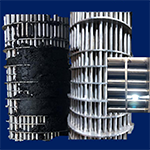Facilitator: Sue L. Reynolds, VP Technology, Carolina Filters, Inc. and Patrick Hill, Manager, Mott Corporation’s Field Engineering Department.
Overview

Essential to re-using metal filters is understanding cleaning methods for removing asphaltenes, organics, and inorganic catalysts fines/sulfur from metal filters, along with, testing methods that quantify the media cleanliness. Bringing the filter media matrix back to a ‘like new’ condition will minimize or eliminate the typical issues related to inadequate cleaning. Effective cleaning & testing will also reduce costs associated with spare filter inventory purchases, along with, the economics of optimizing on-stream life and minimizing unplanned shutdowns.
Information from Case Studies noting improved on-line performance resulting in increased production with cost savings will be provided.
This presentation provides information on the challenges and benefits of filter cleaning in FCCU & rFCCU applications.
Various forms of filtration are used in oil refining applications. Typical issues related to inadequate cleaning in Fluid Catalytic Cracking are;
- Increased maintenance costs
- Lower throughput
- Compromised product quality
To recover metal filters by cleaning, consideration must be given to the following:
- Contaminants: Inorganic & organic salts and residuals including catalysts may have hazardous properties and can be inert to many chemical processes.
- Filter Metallurgy: Issues associated with the metallurgy, as related to the contaminant & cleaning chemistries, can determine whether cleaning is or is not an option.
- Filter Configuration: Whether individual filters or multi-filter bundles are used, the configuration of the system will affect cleaning options.
- Filter Testing: Once cleaned, test methods specially designed the type of filter to determine cleanliness and integrity are important to the refinery as metrics for determining the viability of filter re-use.
Since 1968, Carolina Filters has continually developed technologies and processes to support the world’s metallic filtration cleaning challenges. From our beginnings supporting polyester fiber to the wide range of industries we serve today, Carolina Filters remains committed to technical expertise and engineering the best solutions.

Sue L. Reynolds has been with Carolina Filters for 30 years. During that time, she has worked in all aspects of the cleaning operation with major duties involving process development, procedures, and working with customers in Technical Sales. She has BA in Chemistry from Winthrop University and a Masters in Mathematics from the University of South Carolina. She has published several papers and articles with groups such as the American Filtration & Separations Society that cover various aspects of cleaning & testing. In her spare time, she loves to scuba dive with husband and friends.

Patrick Hill is a Mechanical Engineer and the Manager for Mott Corporation’s Field Engineering Department. Patrick is responsible for designing, building, commissioning, and supporting liquid process filtrations systems like those used to filter FCC/RFCC slurry oil throughout the world. He enjoys the opportunity to educate fellow industry professionals on the advantages of advanced porous metal filtration systems and importance of cleaning and revalidation of filter elements.







